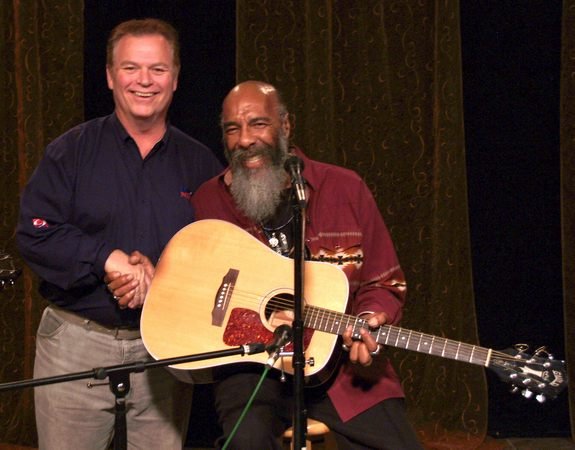Introduction to Richie Havens
Richie Havens was an American folk rock/funk singer-songwriter and musician. All of his albums charted on the Billboaard 200; the most commercially successful of them all was 1971’s Alarm Clock which peaked at #29. His cover of the Beatles’ “Here Comes The Sun” broke into the Top 20 singles circuit also in 1971. Aside from performing soulful covers of other artist’s songs continued to branch out more by appearing as an actor (especially on the stage), collaborating with other artists, and establishing a museum called Northwind Undersea Institute as his manifestation of educating the younger generation about ecological issues. Havens released 19 studio albums, six compilation albums, and nine singles (but only one charted on the Hot 100 that is “Here Comes The Sun”). But more than the numbers, he is still admired and referred to as a “Woodstock icon,” due to his career-turning appearance at the world’s most celebrated rock festival. Havens died on April 22, 2013 in New Jersey, from a sudden heart attack. He was 72 years old.
Early life and career
Folk rock and funk singer-songwriter and guitarist Richie Havens was born Richard Pierce Havens in the secion of Bedford-Stuyvesant in Brooklyn, New York on January 21, 1941. He was of American Indian and British West Indies descent.
Richie Havens was a very gifted, intense and accomplished guitarist, as if he had the knowledge of the instrument on the back of his hand; he was particularly an expert in open tunings. He first joined and became a member of a gospel group when he was just sixteen years old. Looking to broaden his musical and artistic horizons, he left Brooklyn when he was 20. Then he settled first in Greenwich Village, where his talent as a guitarist was recognized, and by then he had become a fixture there.
Recording career
Havens was signed to Douglas Records, where he cut a couple of records. This led him to encounter Albert Grossman (Bob Dylan’s manager) and later sign with Verve Forecast, the folk division of Verve Records, which was a subsidiary of MGM Records. Verve Forecast released Havens’ first official LP Mixed Bag in 1967. The album displayed his distinct guitar style and his rich baritone voice. The album was, and still is, considered by many critics as his best work ever.
But Haven’s follow-up album Something Else Again (1968) was the one that got him truly recognized. It began to hit the Billboard 200 charts and it also helped to pull his prior release Mixed Bag back on the charts again. Two of those LPs were unauthorized “exploitation albums” released by Douglas which were Electric Havens and Richie Havens Record.
Starmaking appearance at Woodstock Festival
Havens’ appearance at the Woodstock Festival in 1969 soared him to fame and really started to fuel his career. It was luck too, that he was assigned as the festival’s first performer, where he held the crowd for almost . He was told to go on performing, because all the other artists that were slated to perform were delayed in arriving at the festival location, with roads leading to the event getting stuck in a traffic jam.
Having run out of material after appearing for several encores, Havens finally performed his own riveting rendition of the old Negro spiritual “I Feel Like a Motherless Child” that became “Freedom.” That Woodstock event was subsequently filmed and released featuring Havens, who greatly benefited from that exposure. An album of the Woodstock event also followed. This starmaking moment at Woodstock led Havens to be referred to as “The Woodstock Icon.”
Following that momentous Woodstock experience, Havens released a new LP Alarm Clock in 1970. It became his most commercially successful album to date, reaching #29 on the Billboard Hot 100 at #29. The success of the album was not only attributed to Havens’ Woodstock appearance, but also in the LP’s single “Here Comes the Sun.” His rendition of the George Harrison-penned Beatles hit became Havens’ most successful single in his career. It peaked at #16 on the Billboard Hot 100 in 1971. By the time the album was released he had also become a successful touring performer.
Later career and final years
By the end of the decade Havens’ focus had shifted mostly doing live performing and less of the studio recording work. However, in 1987 Havens returned with a couple of albums: Simple Things, as well as a compilation album of covers titledSings Beatles and Dylan. Throughout the 1980s and 1990s Havens continued to keep a busy world touring schedule and releasing a steady stream of recordings. In 1991 Havens inked another major-label deal with Sony Music, which released an album called Now that same year.
In his final years Havens published an autobiography They Can’t Hide Us Anymore, co-written with Steve Davidowitz. By then Havens had become a music icon — he was inducted into the Long Island Music Hall of Fame, and was given the American Eagle Award by the National Music Council.
After touring for over forty-five years, Havens retired in 2012 due to health concerns. On April 22, 2013, Havens passed away at his home in New Jersey. He was 72 years old.
